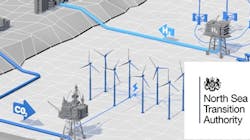NSTA seeks to step up repurposing of UK offshore facilities
Offshore staff
LONDON — Britain’s North Sea Transition Authority (NSTA) has introduced a screening tool for repurposing oil and gas infrastructures.
Repurposing could generate major cost savings for carbon capture and storage (CCS) and hydrogen schemes that would otherwise require investments in new equipment, the NSTA said.
It plans to ask U.K. offshore operators with fields six years from cessation of production to use the new tool to identify which equipment could be repurposed.
In cases where there are no realistic alternatives, the process would allow decommissioning work to progress without unnecessary delays, the NSTA added.
Initially, it plans to send the screening tool to 20 companies operating a total of 120 fields that are nearing, or have reached, the end of their productive lives.
The NSTA will review the submissions, cross-check against its own data and work with operators to explore options to address any barriers to repurposing.
Eni intends to reuse and repurpose existing offshore pipelines and platforms for its Liverpool Bay CCS project in the East Irish Sea, part of the HyNet CCS and hydrogen scheme in northwest England/north Wales.
The NSTA’s initial analysis suggests that opportunities will likely be limited for repurposing platform topsides, jackets and subsea equipment for decarbonization projects, in which case removal and onshore dismantling, or cleaning up and leaving in-situ, will remain the bets options once production ceases.
Its main priority is pipelines, having identified more than 100 which could be suitable for CCS or hydrogen projects. Repurposing these could bring estimated savings of about £7 billion ($8.61 billion), it claims, also lowering decommissioning costs.
The NSTA continues to compile pipeline data and plans to make much of the information available to help advance repurposing projects.
06.21.2022
